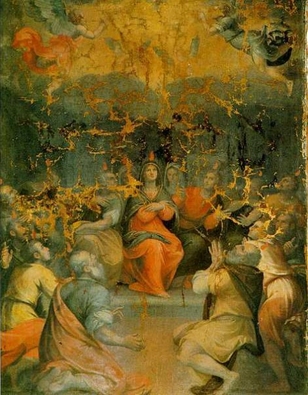In Praise of the Octave of Pentecost

Days of Fire and of Light
In the traditional Roman liturgical calendar the glorious solemnity of Pentecost has its own Octave: eight days under the grace of the Holy Spirit, eight days of joy in the fire and light of His presence, eight days of thanksgiving for His gifts. The Octave of Pentecost was one of the most beautiful moments in the Church Year, not only by reason of the liturgical texts, but also by reason of its effect in the secret of hearts. Each day of the Octave the Church would sing her “Golden Sequence,” the Veni, Sancte Spiritus: a chant of such unction that one never tires of repeating it.
The Suppression of a Great Joy
In some places in the Catholic world, Whit Monday was a reason to have a civil holiday, as well as a liturgical celebration. In this way, the mysterious presence of the Holy Spirit marked even the secular culture. It came as shock, and brought no little distress to the faithful, when in 1969 the Octave of Pentecost suddenly disappeared from the calendar. It would appear that not even the Pope was apprised of the suppression of one of the Church’s great joys.
So the Story Goes
The story goes that on the Monday after Pentecost in 1970 His Holiness Pope Paul VI rose early and went to his chapel for Holy Mass. Instead of the red vestments he expected, green ones were laid out for him. He asked the Master of Ceremonies, “What on earth are these for? This is the Octave of Pentecost! Where are the red vestments?” “Your Holiness,” replied the Master of Ceremonies, “this is now The Time Throughout the Year. It is green, now. The Octave of Pentecost is abolished.” “Green? That cannot be,” said the Pope, “Who did that?” “Your Holiness, you did.” And Paul VI wept.
Paul VI did not weep alone. Many wept with him. It was reported that Catherine de Hueck Doherty of Madonna House was inconsolable. Faithful the world over were speechless at the brutal removal of one of the Church Year’s most cherished moments. In some countries the hierarchy were frightfully embarrassed: the civil calendar had retained the Monday and Tuesday after Pentecost as holidays, while the Church had erased them from hers. Little by little, the voices of those seeking the restoration of the Pentecost came to be heard in high places.
A Breakthrough
The 1998 American edition of the Lectionary contained the following note: “If it is customary or obligatory for the faithful to attend Mass on the Monday or even the Tuesday after Pentecost, the readings from the Mass of Pentecost Sunday may be repeated or the readings of the Ritual Mass of Confirmation may be used in its place.”
The 2002 Missal
In 2002, the Third Typical Edition of the Roman Missal contained a further clarification: “Where on the Monday and also the Tuesday after Pentecost the faithful must (attend Mass) or have the custom of attending Mass, the Mass of Pentecost Sunday may be repeated, or one may say the Mass of the Holy Spirit.”
Basking in the After–Glow
The celebration of Octaves respects a fundamental need of the human person, and of any group of people: the need to linger over anything momentous, the need to bask in the after-glow of events rich in meaning, the need to prolong the feast. Man has an innate capacity and desire for meditatio. Meditatio is the act of repetition by which truth, or beauty, or goodness, passes from the head into the heart. There it becomes life-changing.

Our Infant of Prague will be wearing his red mantle this week, as usual.
You see, these are things many of us just do not understand. Holy Father was not aware that he supressed the octave? Hopefully his tears were tears of repentance.
Don’t be dimayed by my comment Father, Elena gave me this response:
“I guess so many things were being changed and suppressed…it must have been hard to keep track of it all, especially for an older person.
Not to compare Pope Paul to Henry VIII but it reminds me a bit of when Henry was dying and he asked for prayers for his soul in Purgatory. “But your Majesty, you have abolished purgatory,” was the response. Henry could not keep track of all the changes….”
She corrected me, thanks be to God!
My own sense is that there was so much going on the time, so much being rushed through without careful discernment, that His Holiness Pope Paul VI was probably unaware that the Octave of Pentecost had been removed. Paul VI had a Benedictine soul; he wanted to become a monk as a young priest, and had an extraordinary sensitivity to the sacred liturgy. I attribute the removal of the Octave of Pentecost to the hasty and imprudent implementation of Sacrosanctum Concilium.
Could you have meant “the hasty and impudent implementation”…
There was an eagerness to “trim” the sacred liturgy by deleting all medieval additions, such as most of the octaves. It is sad, since many of those things had come about because of the human psychology of worship.
Perhaps Benedict XVI could make a discerning and prudent revision of the liturgical calendar and texts/hymns which would restore liturgical observances like the Octave of Pentecost. Since he is the supreme legislator this could be implemented with sufficient catechesis. It would be a brilliant act if he could do this prior to the forthcoming English translation of the Roman Missal is completed and printed while publishing a separate volume for restored liturgical observances for the editio typica unless he could revision that book too.